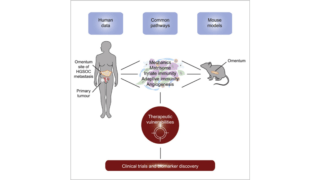Tag: Ovarian
Search News
Categories
Archives
Ovarian Cancer Perspectives: Q&A with Dr Michelle Lockley
18th March 2021
In recognition of Ovarian Cancer Awareness Month, we spoke with Dr Michelle Lockley, Group Leader and clinical researcher in BCI’s Centre for Cancer Cell and Molecular Biology. Dr Lockley’s research group focuses on improving treatments for women with ovarian cancer, particularly for those whose tumours are resistant to chemotherapy.
Read moreChromosomal instability in ovarian cancer
26th November 2020
We spoke with Dr Sarah McClelland and senior postdoctoral researcher in her group, Dr Nadeem Shaikh, about the team’s most recent paper, published in Cancer Research, which set out to explore the mechanisms of chromosomal instability in high-grade serous ovarian carcinoma – the most common type of ovarian cancer. The study sheds light on how these mechanisms may be able to be targeted to overcome treatment resistance in this cancer type.
Read moreProposed new surgery protocol for ovarian cancer
17th August 2020
For women at high risk of ovarian cancer, standard preventive practice is to offer removal of both the fallopian tubes and ovaries, but the surgery induces menopause in women who have not yet reached this stage of life. A proposed alternative two step surgical protocol, which delays the induced menopause caused by the removal of the ovaries, is highly acceptable to this premenopausal group of women.
Read moreBroadening cancer gene testing
21st July 2020
Screening entire populations for breast and ovarian cancer gene mutations could prevent millions more cancer cases across the world compared to current clinical practice, according to an international study led by Queen Mary University of London.
Read morePersonalised ovarian cancer risk prediction reduces worries
18th May 2020
Offering personalised ovarian cancer risk prediction to women shows that 98 per cent of participants felt less worried after finding out their ovarian cancer risk status, according to a new study.
Read moreMouse models of ovarian cancer
27th January 2020
Research led by the Barts Cancer Institute, Queen Mary University of London, has revealed that mouse models of the most common and deadly form of ovarian cancer, high-grade serous ovarian cancer, can effectively replicate the disease in humans. These models provide useful pre-clinical tools that may help to determine which patients are likely to respond to particular treatments.
Read more





